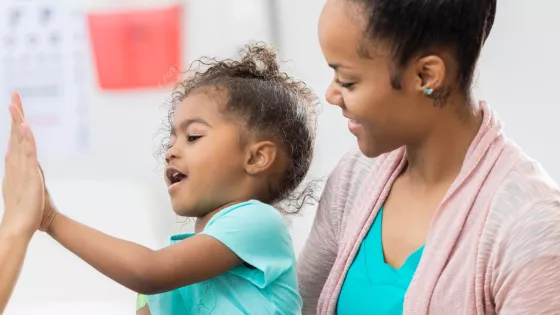The latest figures from the Royal College of Paediatrics and Child Health (RCPCH) show that some areas of epilepsy care for children are improving, but access to services still varies greatly.
RCPCH published its annual Epilepsy12 audit report on 11 July 2024. It highlights services and staffing in children’s epilepsy clinics across England and Wales, as well as information on the experiences of newly diagnosed children and young people with epilepsy. Young Epilepsy works closely with RCPCH on the Epilepsy12 audit and participates in the project board.
Here are some of the key findings:
Epilepsy professionals
- 51% of children with epilepsy were seen by a paediatrician with epilepsy expertise within two weeks of the referral being made. This is a significant increase from 21% last year.
- 81% of children had contact with an epilepsy specialist nurse in their first year of care.
Complex epilepsy
- Only 50% of children who should have been referred to paediatric neurology were able to access that specialist support within their first year of care.
- Only 37% of children who may have benefited from epilepsy surgery were referred to consider this treatment option in their first year of care.
Mental health
- 30% of children’s epilepsy clinics are now providing mental health checks. Although the number is still low, it is a significant increase from last year, which was 20%.
- For those children with epilepsy who had an identified mental health problem, around 2 out of 3 received mental health support in their first year of care (62%).
- Only 18% of healthcare providers include mental health support within epilepsy clinics.
Care planning
- 81% of children had a written care plan in their first year of care that had been agreed between the child or young person, their parents/carers and healthcare team. This is an improvement from 74% last year.
- However, only 65% of children had a care plan that covered key topics that are important for living with epilepsy.
- Communication about Sudden Unexpected Death in Epilepsy (SUDEP) was lowest amongst these key topics.
Transition to adult care
- Two out of three healthcare providers have both adult and paediatric epilepsy professionals involved in young people’s transition to adult healthcare (68%).
- Just over half provided specific outpatient clinics for young people with epilepsy (56%).
Mark Devlin, Chief Executive of Young Epilepsy, said:
Young people have told us that epilepsy can have a huge impact on their emotional wellbeing, so we’re really pleased to see better access to mental health checks and support through epilepsy clinics. We also welcome the improvements in care plans for children and families and increased early access to doctors with epilepsy expertise. However, it is concerning that only half of children referred to paediatric neurology were able to access that specialist support within their first year of care. Young Epilepsy is working closely with colleagues in the NHS to ensure that even more children with epilepsy get the specialist support they need, when they need it.
Find out more about the latest Epilepsy12 results.


